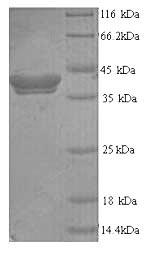This recombinant human thyroid peroxidase (TPO) protein is derived from yeast and features a purity of over 90%, verified through SDS-PAGE. TPO plays a critical role in thyroid function and is essential for research into thyroid diseases and immune responses. The protein is N-terminally tagged with a 6xHis tag for easy detection and purification. This partial protein spans amino acids 19-161 of the human TPO, making it a valuable tool for your research needs. Whether you're studying thyroid function or exploring autoimmune conditions, this high-quality reagent provides reliable performance.
Potential Applications
Note: The following applications are based on the known biological functions of this protein and scientific literature predictions. Our company has not validated all listed applications, and specific effects need to be verified by customers according to their experimental requirements. We recommend conducting small-scale preliminary experiments before formal studies.
Recombinant human thyroid peroxidase (TPO) has several notable applications in research and clinical contexts, primarily due to its role in thyroid hormone synthesis and autoimmune thyroid disorders.
1. Autoimmune Thyroid Disease Studies
- Diagnostic Use for Hashimoto's Thyroiditis: TPO is a key autoantigen involved in Hashimoto's thyroiditis, a major autoimmune thyroid disorder. Its recombinant form is used for diagnosing thyroid autoimmune disorders, especially when antibodies against TPO (anti-TPO) are present. The detection of anti-TPO antibodies is commonly used for diagnosing autoimmune thyroiditis and distinguishing it from other thyroid diseases [1].
- Understanding Mechanisms of Autoimmune Responses: Recombinant TPO is used to study the immunological mechanisms behind thyroid autoimmunity, particularly the role of TPO in stimulating the production of anti-TPO antibodies [2].
2. Thyroid Cancer Research
- Investigation of Thyroid Cancer Risks: High titers of anti-TPO antibodies have been linked to an increased risk of differentiated thyroid cancer (DTC). Recombinant TPO can be utilized to investigate the association between TPO antibodies and thyroid cancer development, providing insights into the potential prognostic value of TPO antibodies in cancer risk assessment [3].
3. Fertility and Reproductive Health
- Autoimmune Thyroid Disease and Pregnancy Outcomes: Recombinant TPO plays a role in studying the effects of thyroid autoimmunity on pregnancy outcomes, such as miscarriage, preterm birth, and fertility issues. It is used in research exploring the role of anti-TPO antibodies in early pregnancy loss and subfertility in euthyroid women [4].
- Assisted Reproductive Technology (ART): Elevated anti-TPO antibodies have been linked to poor outcomes in ART. Recombinant TPO aids in understanding how the immune response to TPO affects ART success rates, including miscarriage and live birth rates [4].
4. Thyroid Hormone Synthesis Research
- Study of Hormone Synthesis Mechanisms: Recombinant TPO, as a critical enzyme in thyroid hormone biosynthesis, is used to explore the biochemical pathways involved in iodination and coupling of thyroglobulin. This helps in understanding the molecular processes behind thyroid hormone production [5].
5. Genetic and Population Studies
- Identification of Genetic Variants: Recombinant TPO is used in genetic studies to identify mutations in the TPO gene associated with congenital hypothyroidism (CH) and other thyroid-related disorders. These studies help in understanding the genetic basis of TPO-related pathologies [6].
References
1. Sinclair D. Clinical and laboratory aspects of thyroid autoantibodies. Ann Clin Biochem. 2006;43(3):173-183. doi:10.1258/000456306776865043.
2. McIntosh R, Weetman AP. Molecular analysis of the antibody response to thyroglobulin and thyroid peroxidase. Thyroid. 1997;7(3):471-487. doi:10.1089/THY.1997.7.471.
3. Anagnostis P, Imam S, Jaume J, et al. The role of thyroid peroxidase antibodies on the risk of thyroid cancer: a systematic review and meta-analysis. J Endocr Soc. 2022. doi:10.1210/jendso/bvac150.1767.
4. Zhang S, Yang M, Li T, et al. High level of thyroid peroxidase antibodies as a detrimental risk of pregnancy outcomes in euthyroid women undergoing ART: A meta-analysis. Mol Reprod Dev. 2023;90(3):218-226. doi:10.1002/mrd.23677.
5. Ruf J, Carayon P. Structural and functional aspects of thyroid peroxidase. Arch Biochem Biophys. 2006;445(2):269-277. doi:10.1016/J.ABB.2005.06.023.
6. Molina MF, Pío MG, Scheps K, et al. Curating the gnomAD database: Report of novel variants in the thyroid peroxidase gene using in silico bioinformatics algorithms. Mol Cell Endocrinol. 2022;558:1-15. doi:10.2139/ssrn.4145417.






